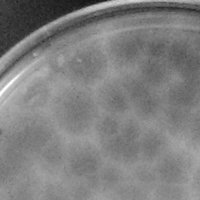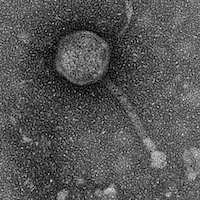Mycobacterium phage Terricula
Know something about this phage that we don't? Modify its data.
| Detailed Information for Phage Terricula | |
| Discovery Information | |
| Isolation Host | Mycobacterium smegmatis mc²155 |
| Found By | Casey Trevino |
| Year Found | 2016 |
| Location Found | Corpus Christi , TX USA |
| Finding Institution | Del Mar College |
| Program | Science Education Alliance-Phage Hunters Advancing Genomics and Evolutionary Science |
| From enriched soil sample? | Unknown |
| Isolation Temperature | 37°C |
| GPS Coordinates | Unavailable |
| Discovery Notes | 1. When collecting the sample for the phage the soil collected was of different medias containing pieces of soil, dirt, small crushed pebbles or rocks and chips of wood, as well as the plants surrounding the soil had began to what i believe "spit out" the seeds. Around and deep under the plants shadow is where the soil sample was collected, however this is where the seeds were gathered the most. 2. During the initial spot test Terricula (phage) cleared off the initial plate for a series of three times before we could catch the perfect plate and stop it from dying off, meaning we could not let any form of spot testing on its own sit for more then 3 days. 3. Every dilution that was produced, 10^-1 through 10^-3 would clear completely leaving nothing in its tracts. 4. For this specific phage you will need to repeat the spot test and dilutions if not done correctly in a timely matter. |
| Naming Notes | The name Terricula is the latin word for "Phantom" and "Scarecrow". During the first spot test the phage was very vigorous that it would clear off the bacteria and itself. The name "phantom" started to come to mind due to the fact that it seemed almost impossible to catch the phage at the perfect moment. During the Serial Dilution process the phage it self was complex to catch in order to achieve the perfect web plate due to the phage would eat through the first 3 or 4 plates or so. Once this became more of a constant thing, the word "Phantom" was more and more fitting. "Phantom" is a copyright name that has already been claimed, so the next best name for this phage turned into Terricula. phage: Terricula is perfect, it represents phantom but also like a scarecrow whos job is to keep away the crows from harming its crops, a phage does the exact same characteristics in its own way. |
| Sequencing Information | |
| Sequencing Complete? | No |
| Sequencing Facility | University of North Texas |
| Shotgun Sequencing Method | Illumina |
| Genome length (bp) | Unknown |
| Character of genome ends | Unknown |
| Fasta file available? | No |
| Characterization | |
| Cluster | Unclustered |
| Subcluster | -- |
| Lysogeny Notes | the characteristics of the the Lysogeny, the first plates 10-1 to-4 were completely cleared off, where from plates 10-5 to-10 the plates appeared almost like a reference to when a caterpillar eats through a leaf, the sections that were cleared were clean and crisp with a few edgings of haze around the clearings. the color was clear of the clearings but the edges appeared like halos which were a soft haze that you could see with the eye, but when placed in the lighting you could see small openings clearly mixed with the halo. |
| Annotating Institution | Unknown or unassigned |
| Annotation Status | Not sequenced |
| Plaque Notes | The plaques were huge, by huge i mean they covered a good amount of our plate during the HTL single. they were indeed bulls eye sized definitely. When you look at the MTL or Terricula and the first dilutions the plaques were indeed big to size, a professor even referenced the web plates to look like "text book plates". Terricula has plaques in over all that look like huge holes that were made in a plate like as if a gun had been shot through it. |
| Morphotype | Siphoviridae |
| Has been Phamerated? | No |
| Publication Info | |
| Uploaded to GenBank? | No |
| GenBank Accession | None yet |
| Refseq Number | None yet |
| Archiving Info | |
| Archiving status | Archived |
| Pitt Freezer Box# | 34 |
| Pitt Freezer Box Grid# | H6 |
| Available Files | |
| Plaque Picture | Download |
| EM Picture | Download |

